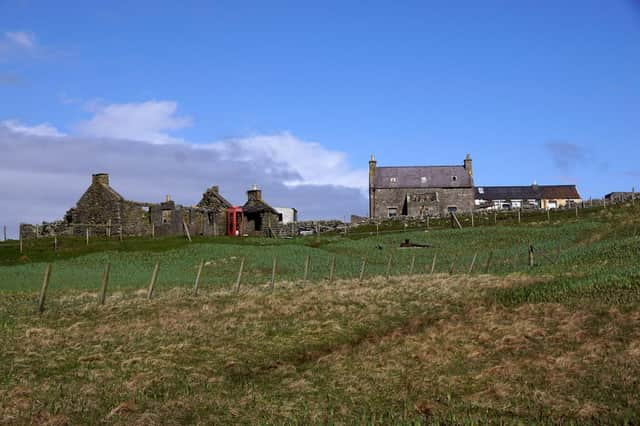Pandemic thwarts traditions on tiny Scottish island celebrating Christmas today


Foula, which sits 20 miles west off the Shetland mainland deep in the North Atlantic Ocean, observes the festivities according to the old Julian calendar.
The 30 or so residents of the island may perhaps be the last in Western Europe to observe Christmas on January 6, with the Julian calendar replaced by the Gregorian calendar more than 430 years ago with 11 days later deleted from the year.
Advertisement
Hide AdAdvertisement
Hide AdToday, however, Foula, with its tiny population and relatively remote location, feels the very modern threat of the coronavirus pandemic as mercissely as anywhere else.
The usual celebrations of meeting neighbours, opening up homes, playing music and drinking long into the night on January 6 are cancelled this year on the island.
Amy Ratter, a crofter of the main settlement of Hametoun, said: “Normally we would go round each other’s houses, deliver gifts and end up playing tunes and drinking late. There is none of that this year.”
Ms Ratter said that a number of Foula residents had gone to the Shetland mainland for Christmas Day to see relatives and were now keeping away from each other on their return to Foula.
"We are very much keeping ourselves to ourselves at the moment,” Ms Ratter added.
The crofter said the day started like any other – by feeding her animals – with the morning giving way to opening gifts and preparing the meal for this evening.
“Everything we will eat tonight comes from the croft, the lamb, the vegetables.”
Ms Ratter described January 6 as a celebration of Yule, the Pagan winter festival, as opposed to Christmas.
Advertisement
Hide AdAdvertisement
Hide AdIn normal times, having the two celebrations was often convenient, she added.
"My ex-husband lives on the mainland so my children can spend Christmas with him and then Yule with me,” Ms Ratter said.
Up until around 15 years ago, a hunt for the cormorant seabird was the tradition that marked the day.
"There was shooting and hunting, although we don’t take Yule out on the wildlife anymore, which isn’t doing as well now,” Ms Ratter said.
Keeping the Christmas tree going until January 6 was sometimes an issue.
“You put it in water and try and keep it cold, and hope that it lasts until today,” she added.
According to accounts, Pope Gregory XIII took issue with the Julian calendar in 1582. On assuming that each year contained 365-and-a-quarter days, an error built up over time with each year accumulating an extra 11 minutes. As a result, the calendar sat out of sync with the seasons.
Britain, reluctant to conform to European ways, did not adopt the Gregorian calendar until 1752, when 11 days had to be deleted. Outcry came from some quarters amid the refrain “give us back our 11 days!”.
Advertisement
Hide AdAdvertisement
Hide AdWhile most places quickly conformed, the Highlands and Islands continued to celebrate their important festivals 11 days later.
In Shetland, the new calendar was adopted in Lerwick in 1879. But in Foula, the change never came.
Ms Ratter said: “We have always done it this way and I can't see it ever changing.”
